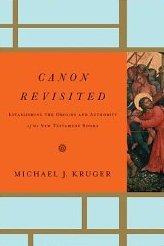 I recently finished reading an excellent book entitled Canon Revisited: Establishing the Origins and Authority of the New Testament Books by Dr. Michael J. Kruger. The book deserves a full review which I unfortunately do not have time for, but let’s just say I highly recommend it. I learned so much. For example:
I recently finished reading an excellent book entitled Canon Revisited: Establishing the Origins and Authority of the New Testament Books by Dr. Michael J. Kruger. The book deserves a full review which I unfortunately do not have time for, but let’s just say I highly recommend it. I learned so much. For example:
God’s books are authoritative prior to anyone using them or recognizing them. Surely, the existence of canon and the recognition of canon are two distinguishable phenomena. Why, then, should the term canon be restricted to only the latter? This distinction is critical because it reminds us that neither the church’s use of these books (functional definition) nor the church’s final reception of these books (exclusive definition) is what makes them canonical. They are canonical by virtue of what they are, namely, God’s books (Kruger, Canon Revisited, loc. 1070).
I have never heard this explained so clearly and yet still in such depth. There are hundreds of detailed footnotes in each chapter, many of which were interesting to read also. So if you have every wondered whether not the Christian church has the right books in the New Testament, go get yourself a copy! I have never met Dr. Kruger and get nothing from promoting his book. I just want to recommend this excellent work on a very important topic. Quit wasting your time reading this blog and go read Canon Revisited.








